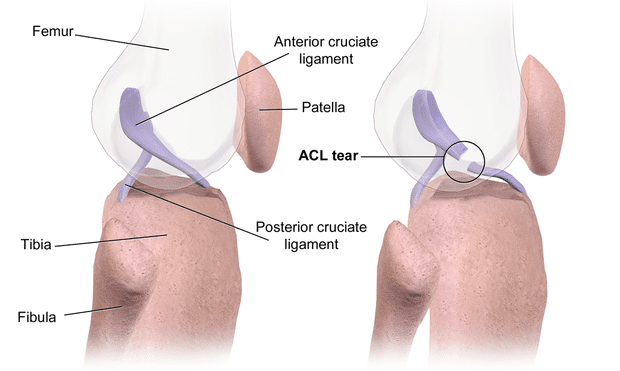
18 Dec Genetics Raises Risk of ACL Injury
MedicalResearch.com Interview with:

Dr. Magnusson
Karin Magnusson PT, PhD
Associate Researcher
Lund University and
Norwegian Institute of Public Health
MedicalResearch.com: What is the background for this study?
Response: Anterior cruciate ligament (ACL) injury is one of the most common knee injuries, for which very limited data has been presented on the genetic contribution. Based on our knowledge of the role of genetics in the development of ACL-rupture related traits, such as joint hypermobility and knee osteoarthritis, we hypothesized that heritability might play a role also in ACL injury.
Using the Swedish Twin Registry, which is the world’s largest twin registry and in this study including more than 88.000 twins, we had unique data to for the first time reliably estimate the heritability for this common knee injury.
MedicalResearch.com: What are the main findings?

ACL Tear (Wikipedia Image)
Response: The genetic contribution to ACL injury was ~69%, which is surprisingly high considering this injury has been believed to be mainly caused by external factors including bad luck. This genetic contribution should not be interpreted to mean an individual’s risk of suffering the injury is 69 per cent, rather that it is significant in terms of the wider population. Heredity is easier to understand when compared with other illnesses or conditions. The genetic risk of suffering from cancer is 33 per cent, for example. This means that 33 per cent of variation within the population in terms of causes of all cancer cases is due to genetic variation, while the rest is due to other factors – such as environment or lifestyle.
MedicalResearch.com: What should readers take away from your report?
Response: A more clinically relevant interpretation might be that the risk of suffering from ACL injury increases by 20-140% if one has a sibling who already has suffered such an injury. These findings may have consequences for injury prevention among athletes, i.e. preventive programs may be additionally important for athletes if family members have ruptured their ACLs.
MedicalResearch.com: What recommendations do you have for future research as a result of this work?
Response: We should study whether anatomical or physiological conditions could affect the risk of a cruciate ligament injury. I think we also need to study the interaction between genetic factors and the environment in more detail. For example, to what extent do twins choose same activities and how much risk do they take, as well as type of underground for sports, shoe wear, etc. In future prediction models of whom will suffer from an ACL injury, family information should be included.
We have no disclosures.
Citation:
Magnusson K, Turkiewicz A, Hughes V, et al
High genetic contribution to anterior cruciate ligament rupture: Heritability ~69%
British Journal of Sports Medicine Published Online First: 07 December 2020. doi: 10.1136/bjsports-2020-102392
JOIN OUR EMAIL LIST
[mailpoet_form id="5"]We respect your privacy and will never share your details.
[last-modified]
The information on MedicalResearch.com is provided for educational purposes only, and is in no way intended to diagnose, cure, or treat any medical or other condition. Always seek the advice of your physician or other qualified health and ask your doctor any questions you may have regarding a medical condition. In addition to all other limitations and disclaimers in this agreement, service provider and its third party providers disclaim any liability or loss in connection with the content provided on this website.
Last Updated on December 18, 2020 by Marie Benz MD FAAD
